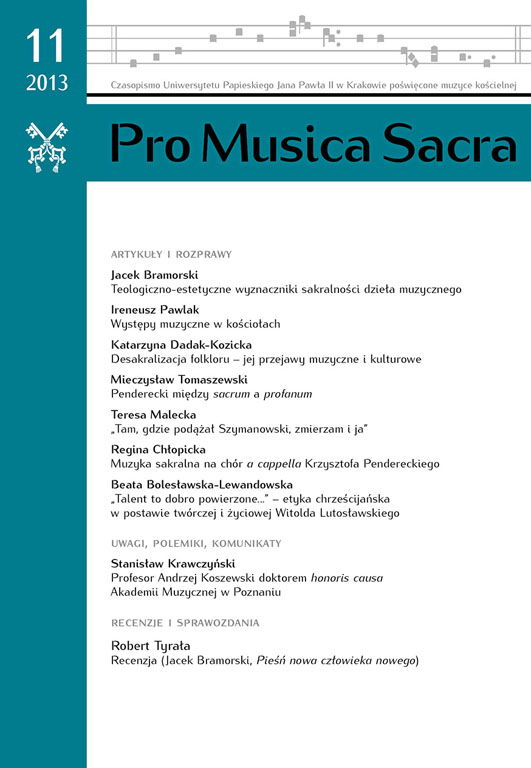Miejsce i rola solowej muzyki organowej w liturgii Kościoła rzymskokatolickiego
DOI:
https://doi.org/10.15633/pms.566Słowa kluczowe:
muzyka w liturgii, organy, muzyka organowaAbstrakt
Incorporating solo organ music in Roman Catholic liturgy may constitute a challenge for some organists. The very issue may raise some doubts and problems. “This usually results from insufficient education of professional organists”27. Fortunately, this is an invalid myth, easy to refute, bearing in mind the years of work and impact made by numerous Organist schools operating within dioceses, as well as Institutes of Church Music. Great numbers of broadly educated church musicians graduate from these schools every year. Unfortunately, constant rush and marginalization of the organist’s position in liturgy tend to discourage young organists. The majority of employers seem to be focusing on singing with the people, small choirs with the accompaniment of guitar or, possibly, parish choirs themselves.
It is true that we “should intently urge churchgoers to actively participate in liturgy in the form of singing”28. This is probably why the church organist is usually considered the person to set the proper tone and keep up the singing in the church! For churchgoers, however, a good organist is the one who sings well…
This is true, but only partially. The Second Vatican Council reminds us of the importance of the organ, an instrument “adding a grandeur dimension to church ceremonies, raising the souls and minds of believers to God and heavenly matters”29. How should we then consider the role of the organ in the liturgy of today, in the light of post-council documents? It may be assumed that the very participation of this majestic instrument in the liturgy adds grandeur, although pipe organ accompanying churchgoers singing tends to perform a secondary role.
It is rather solo organ music which could make the Eucharist more dignified and grandly. It could also bring God’s people closer to God. Church documents are, however, very rigid in this matter – “solo music shall only be possible in the beginning, before the chaplain attends the altar, during the oblation, during the Communion and in the end of the mass”.
Organ music performances during the Lent seem to be a separate issue since they are strictly prohibited by some church documents. In the opinion of priest I. Pawlak “fasting” from music reduces the liturgy in its integral substance, and a heartless or fanatic approach to fasting undermines the essence of liturgical activities”. Therefore, all church musicians are optimistic to witness the changing stance of the Polish Episcopal Conference, which, in its new Instructions issued in 1979, adopted a more liberal approach.
Pobrania
Opublikowane
Numer
Dział
Licencja
Prawa autorskie (c) 2013 Witold Zalewski

Utwór dostępny jest na licencji Creative Commons Uznanie autorstwa 4.0 Międzynarodowe.
Autorzy publikujący w czasopiśmie udzielają jego wydawcy zgody o następującej treści:
- Autor zachowuje autorskie prawa majątkowe do utworu, a jednocześnie udziela wydawcy czasopisma zgody na jego pierwszą publikację w wersji drukowanej i wersji online na licencji Creative Commons Uznanie autorstwa 4.0 Międzynarodowe oraz zgody na wykonywanie opracowań, w tym przekładów.
- Autor ma możliwość udzielania zgody niewyłącznej na opublikowanie utworu w wersji, która ukazała się w czasopiśmie (np. zamieszczenia go w repozytorium instytucjonalnym lub opublikowania w książce), wraz z informacją o jego pierwszej publikacji w czasopiśmie.
- Autor może umieścić swój utwór online (np. w repozytorium instytucjonalnym lub na swojej stronie internetowej) jeszcze przed zgłoszeniem utworu do czasopisma.

